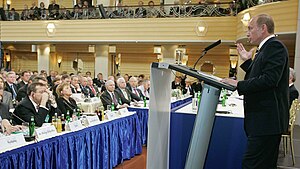Benutzer:Carl.Bauer.Leipzig/Wladimir Putins Rede in München 2007
Wenn du dies liest:
|
Wenn du diesen Artikel überarbeitest:
|
Wladimir Putins Rede in München 2007 ist eine vom russischen Präsidenten Wladimir Putin am 10. Februar 2007 auf der 43. Münchner Sicherheitskonferenz gehaltene Rede. In Russland ist sie auch als Münchner Rede bekannt. Darin formulierte Putin bedeutende Eckpunkte der russischen Außenpolitik.[1][2][3][4]
Inhalt
In der Rede kritisierte Putin eine monpolistische Vormachtsstellung der Vereinigten Staaten in den
Putin criticized what he called the United States' monopolistic dominance in global relations, and its "almost uncontained hyper use of force in international relations". The speech came to be known, especially in Russia, as the Munich speech. He said the result of such dominance was that,
Vorlage:BlockquotePutin also quoted from a 1990 speech by Manfred Wörner to support his position that NATO made a binding promise not to expand NATO into new countries in Eastern Europe:
Putin publicly opposed plans for the U.S. missile shield in Europe, and presented President George W. Bush with a counter proposal on 7 June 2007 which was declined.[5] Russia suspended its participation in the Treaty on Conventional Armed Forces in Europe on 11 December 2007 because:
Reaktionen
In response, former NATO secretary Jaap de Hoop Scheffer called it, "disappointing and not helpful."[6] The months following the Munich speech[7] were marked by tension and a surge in rhetoric on both sides of the Atlantic, though both Russian and American officials, however, denied the idea of a new Cold War.[8] The Polish Institute of International Affairs has described Putin's quotation from Manfred Wörner's speech as lacking appropriate context.[9]
Follow-ups
Putin later made other speeches that were called[10] follow-ups to the Munich speech. These include:
- The Crimean speech of Vladimir Putin in Moscow, 18 March 2014
- The Valdai speech of Vladimir Putin in Sochi, 24 October 2014
- U. N. General Assembly speech in New York, 28 September 2015 ("I'm urged to ask those who created this situation: do you at least realize now what you’ve done?")[11]
See also
References
Links
- Tenth Anniversary of Putin’s Munich Speech: A Commitment to Failure — Jamestown Foundation, 2017
- The Daily Vertical: 10 Years Ago Today, Putin Declared War (Transcript) — RFERL, 2017
[[Category:2007 in Germany]] [[Category:2007 in Russia]] [[Category:2007 in politics]] [[Category:2007 speeches]] [[Category:Events in Munich]] [[Category:February 2007 events in Europe]] [[Category:Russia–NATO relations]] [[Category:Speeches by Vladimir Putin]]
- ↑ Putin says U.S. Wants to dominate world. In: Reuters, 10 February 2007.
- ↑ Thom Shanker, Mark Landler: Putin Says U.S. Is Undermining Global Stability. In: The New York Times, 11 February 2007.
- ↑ Putin rails against US foreign policy. In: Financial Times, 10 February 2007.
- ↑ Putin Slams US for Making World More Dangerous | DW | 10.02.2007.
- ↑ Press Conference following the end of the G8 Summit. In: kremlin.ru . 8 June 2007. Abgerufen am 10. Juni 2019.
- ↑ Rob Watson: Putin's speech: Back to cold war? Putin's speech: Back to cold war?, BBC News. 10 February 2007. Abgerufen am 10. Juni 2019.
- ↑ Referenzfehler: Ungültiges
<ref>-Tag; kein Text angegeben für Einzelnachweis mit dem Namen Munich. - ↑ Munich Conference on Security Policy, As Delivered by Secretary of Defense Robert M. Gates, 11 February 2007. In: DefenseLink . United States Department of Defense. Archiviert vom Original am 14. Februar 2007.
- ↑ Documents Talk: NATO-Russia Relations After the Cold War 2020, ISBN 978-83-66091-61-0, S. 375.
- ↑ Munich – Valdai – Crimea.
- ↑ 70th session of the UN General Assembly. In: kremlin.ru . 28 September 2015. Abgerufen am 10. Juni 2019.
